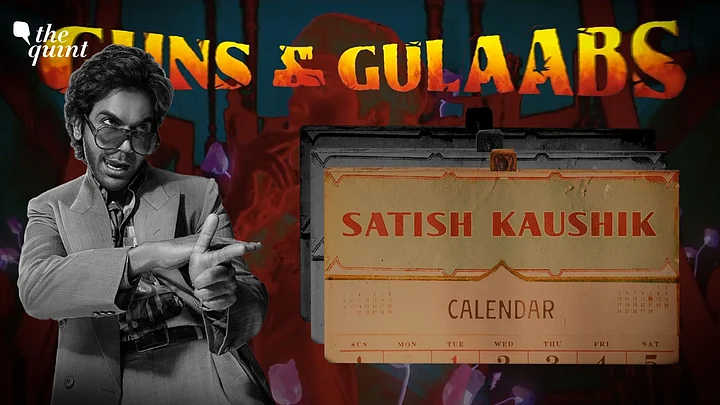In the fictional town of Raj and DK's latest Netflix outing Guns and Gulaabs, everyday life seems very slow. It's the 90s, a time when technology hadn't wreaked havoc in our lives. The show opens with a shot of plush opium fields, but as the layers peel, you realise what a mad, mad world the duo has created. There are warring landlords, corrupt cops, gun-wielding goons, school kids and residents who are caught in the crossfire.
Right from the poster to certain characters, Bollywood is present in every detail of Guns and Gulaabs. And not just this show, many contemporary Hindi movies and shows are replete with references to old films, songs and characters. Let's take a look at some of them:
Guns and Gulaabs
The black-comedy-crime-thriller is an out-and-out Raj & DK show. The drama unfolds in a fictional town called Gulaabganj. The show opens with Ganchi (late Satish Kaushik), who runs an "opium empire" in Gulaabganj. When Ganchi lands the biggest deal of his life, his biggest rival seizes the opportunity to ruin the deal. This sets off a chain reaction, where totally unrelated and diverse characters hatch plans to seize the deal.
Set in the early 1990s, what defines Guns and Gulaabs is its relationship with nostalgia and a hat tip to Bollywood of the 1990s. For example, let's start with the title logo itself. The rough, jagged but huge letters popping out from the brightest of backgrounds is a bow to the classic hand-painted Hindi film posters.
Secondly, the end credits appear over 'memories' from that era - a stereo, old television screens, envelopes with stamps stuck to them etc. The best among them is Satish Kaushik's name printed on a paper calendar, an ode to his Mr India character.
As the series progresses, we realise that almost each and every character of Gulaabganj is shaped by the film and music of that time. Police officer Arjun (played by Dulquer Salmaan), throws away an audio cassette playing 'Hoga Tumse Pyaara Kaun' from Zamaane Ko Dikhana Hai the moment he realises it's a 'Jhaankar Beats' (remixed) version. In another episode, Arjun doesn't exit the car till he finishes listening to his favourite part of a song. In yet another scene, Arjun and his wife dance to 'Tu Tu Hai Wahi' from Yeh Vaada Raha.
The long-haired, chain-smoker Atmaram brings to mind Sanjay Dutt's character from Khal Nayak (1993), Ballu. Atmaram is the classic villain from the 80s and 90s. His best friend is a knife, which he uses to slice his targets. People communicate through phone booths, and Atmaram enjoys the timer while speaking to his entitled and snobbish employers. He even uses the classic Bollywood threat "agar tumhari beti ko zinda dekhna chahate ho" on Arjun after he kidnaps the cop's daughter.
Every episode is also named after some old song or movie. For example, episode three is titled 'Kasam Paida Karnewale Ki', a hat-tip to the Mithun Chakraborty film by the same name.
Similarly, 'Do Dil Mil Rahe Hai' (Chapter 5) and 'Raat Baaki...' (Chapter 7+8) are references to the iconic songs from Pardes and Namak Halaal.
Rocky Aur Rani Kii Prem Kahaani
The music album of Karan Johar's latest film, Rocky Aur Rani Kii Prem Kahaani, is a love letter to old Hindi songs. We have 'Abhi Na Jao Chhod Kar' from Shaam Mastani, 'Hum Tum Ek Kamre Mein' from Bobby, 'Chaudhvin Ka Chand' from Chaudhvin Ka Chand, Aaj Mausam Bada Beimaan Hai from Loafer etc. For the song 'Jhumka', Pritam and the team gave a spin to the iconic Asha Bhosle track 'Jhumka Gira Re' from the 1966 movie Mera Saaya.
"He wanted LPs (long play)... so the structuring of the songs changed. Every song has two 'antara' (paragraphs) and they are about five to six-minute long. If you see the whole movie, it is full of nostalgia, emotions, everybody is singing old songs and we have used them in the background. The soundscape is like that", Pritam had said in an interview.
And then there's a beautiful tribute to Yash Chopra. Alia's chiffon sarees take us back to Chopra's heroines, who were dressed in exquisite chiffons.
Monica, O My Darling
When it comes to inserting Easter eggs in films and shows, Vasan Bala's Monica, O My Darling is a treat. A self-confessed fan of retro Bollywood, Vasan scripted a taut whodunit and peppered it with pop-culture references.
When the film released, what caught the eye of most people were the names of 'residents' on the facade of a building. A closer look showed that they were, in fact, names of directors who have perhaps inspired Vasan. Among the Hindi filmmakers were Sriram Raghavan, Vishal Bhardwaj, Guru Dutt, Pankaj Advani, Vijay Anand, Anurag Kashyap. There was one name - Sarika Vartak - who is not a director. It was Urmila Matondkar's character's name in Ek Hasina Thi!
There are numerous Raghavan references throughout the film. In one scene, Jayant (Rajkummar Rao) is shown sitting on a sofa at home, with Johnny Gaddar playing in the background. Incidentally, the film has a character (played by Dharmendra) saying, ‘You have gone down a dark path, my son,’ mirroring exactly what happened to Jayant.
In another scene, Radhika Apte, playing a cop, is shown exiting a building which has ‘Bank of Badlapur’ written on it. Badlapur is a Sriram film that starred Radhika.
In another scene, Jayant is seen swallowing a piece of paper that is important evidence in the case. It's a direct reference of the same thing done by Shah Rukh Khan's Vicky in Abbas Mustan's Baazigar.
(At The Quint, we question everything. Play an active role in shaping our journalism by becoming a member today.)
